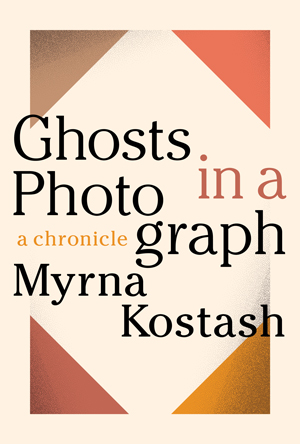“Eventually we inherit the family photographs,” begins Myrna Kostash’s Ghosts in a Photograph. Now keeper of her family’s history, Kostash wonders about the unknown faces—ancestors about whom, by the time she inherited these photos from her parents, it was too late to ask. From that starting point, the writer sets out to bridge a divide that will resonate for many Canadians, the gap between old country and new, “the chasm that splits open family histories at the point of emigration.” Ghosts addresses a common experience: “Within a generation the two branches of the family had become strangers to each other, or at least strange.”
Kostash has long investigated her Ukrainian heritage in work alternating between Canadian topics and European locales where she “discerned a prior identity to that of the hyphenated ethnic in Alberta.” Structuring the book around her grandparents, Kostash delves into the backstories of each of hers—five, including her mother’s stepfather—“be they farmers or child-bearers, members of a local intelligentsia or working-class menials, socialists or the pious unlettered.” As the family tree wends through shifting political ground in the old country, Kostash sifts through potential truths, tracking revolutions and regimes through chapters such as “Versions of a Murder.” There’s no shortage of legwork for the non-fiction writer, and readers are taken on an intriguing ride, learning “the version you heard in Canada is the helpful one for the family.” Behind the Iron Curtain, protecting the family took precedence over notions of accuracy. Russia’s 2022 invasion of Ukraine drives home the necessity of such chilling practicality.
Via sources such as family memoir, letters, news clippings and Kostash’s own prior work, Ghosts takes up “the necessary evolution of family storytelling across generations and locations (continents!).” From an early career article “opining, without presenting much evidence, on the identity and presumed history of my maternal Baba” to reflections on how her sense of plains culture has evolved since reviewing Rudy Wiebe’s The Temptations of Big Bear, Kostash re-examines her assumptions about her family and larger Canadian narratives. This self-reflexivity makes a book about history feel excitingly of-the-moment.
Informed by texts such as Paulette Regan’s Unsettling the Settler Within and Roger Epp’s We Are All Treaty People, Kostash articulates how Ukrainian-Canadians exemplify Epp’s “history-from-below,” which describes how history is often written “not at all by ‘victors’ but by the internal coherence of a community of underdogs.” Here Kostash transcends particulars to nick the roots of settler mythologies across Canada. “Heroes of our own stories… we tell the story almost exclusively as though we sprang from the territory self-made.” Probing family lore about the homesteading years, Kostash notes when tales stop mentioning Indigenous and settler interactions. Again, she outlines plausible versions. Did they catch fish the first winter, “or had Indigenous fishers already made the rounds of the homesteads, bartering frozen fish (for Ukrainian Christmas Eve)?” She confesses: “I am torn between the obligation to acknowledge that my forebears’ legacy is far from concluded and the ancestral duty I have to honour their lives. Both impulses are at play in revisiting the Canadian stories from the intellectual and moral perspective of my own life and age.” Readers are let into the mature author’s reckoning, making the stories more complete.
A tribute to perseverance and community, Ghosts in a Photograph works toward common ground, “the image of the good earth and its fruits that sustain us as an icon of sharing.”
K.B. Thors is a poet and translator from Red Deer County.


